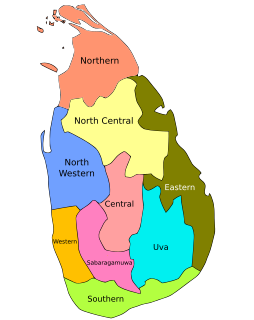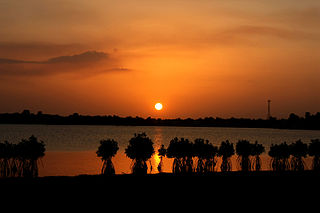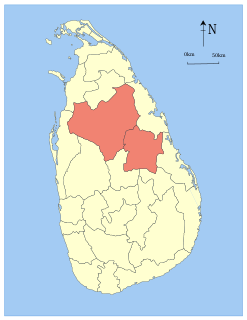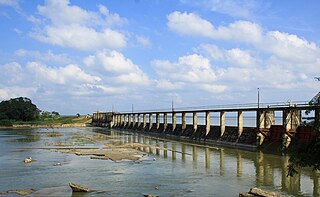Kaaraiththoor | |
|---|---|
| Country | |
| Province | Northern Province |
| Time zone | UTC+5:30 (Sri Lanka Standard Time) |
Kaaraiththoor is a small town in Sri Lanka. It is located within Northern Province. [1]
Kaaraiththoor | |
|---|---|
| Country | |
| Province | Northern Province |
| Time zone | UTC+5:30 (Sri Lanka Standard Time) |
Kaaraiththoor is a small town in Sri Lanka. It is located within Northern Province. [1]

In Sri Lanka, provinces are the first level administrative division. They were first established by the British rulers of Ceylon in 1833. Over the next century most of the administrative functions were transferred to the districts, the second level administrative division. By the middle of the 20th century the provinces had become merely ceremonial. This changed in 1987 when, following several decades of increasing demand for a decentralization, the 13th Amendment to the 1978 Constitution of Sri Lanka established provincial councils. Currently there are nine provinces.

The Eastern Province is one of the nine provinces of Sri Lanka, the first level administrative division of the country. The provinces have existed since the 19th century but did not have any legal status until 1987 when the 13th Amendment to the Constitution of Sri Lanka established provincial councils. Between 1988 and 2006 the province was temporarily merged with the Northern Province to form the North Eastern Province. The capital of the province is Trincomalee.

North Central Province is one of the nine provinces of Sri Lanka, the first level administrative division of the country. The provinces have existed since the 19th century but did not have any legal status until 1987 when the 13th Amendment to the Constitution of Sri Lanka established provincial councils. The province is the largest by size, and second least populated in the country. The province consists of the districts of Anuradhapura and Polonnaruwa, both of which were important ancient Sri Lankan kingdoms. The climate is semi-arid, and the forests are dry evergreen forests.

UTC+05:30 is an identifier for a time offset from UTC of +05:30. This time is used in India and Sri Lanka, and was formerly used in Nepal. It is five and a half hours ahead of Coordinated Universal Time. Around 1.4 billion people live inside this time zone, making it the second most populous after UTC+08:00.

The following is a list of schools in Sri Lanka.

Kilinochchi District is one of the 25 districts of Sri Lanka, the second level administrative division of the country. The district is administered by a District Secretariat headed by a District Secretary appointed by the central government of Sri Lanka. The capital of the district is the town of Kilinochchi.

Mullaitivu District is one of the 25 districts of Sri Lanka, the second level administrative division of the country. The district is administered by a District Secretariat headed by a District Secretary appointed by the central government of Sri Lanka. The capital of the district is the town of Mullaitivu.

The following outline is provided as an overview of and topical guide to Sri Lanka:
The 1978 Constitution of Sri Lanka provides for the election of members of Parliament from 22 multi-member electoral districts through the proportional representation electoral system.
Thirunelveli is a town in Jaffna District, Sri Lanka. The name in Tamil transliterates to "God's-paddy-field." It is located about 5 km from Jaffna. This is the location of a LTTE attack that killed 13 soldiers of the Sri Lanka Army in July 1983, triggering the Sri Lankan Civil War.

The Central Province is one of the nine provinces of Sri Lanka, the first level administrative division of the country. The Central Province is primarily in the central mountainous terrain of Sri Lanka. It is the 6th largest province by area and is home to 2.5 million people. It is bordered by North Central Province to the north, Uva Province to the east, North Western Province to the west and Sabaragamuwa Province to the south and west. The province's capital is Kandy.

The Northern Province is one of the nine provinces of Sri Lanka, the first level administrative division of the country. The provinces have existed since the 19th century but did not have any legal status until 1987 when the 13th Amendment to the Constitution of Sri Lanka established provincial councils. Between 1988 and 2006 the province was temporarily merged with the Eastern Province to form the North Eastern Province. The capital of the province is Jaffna. The majority of the Sri Lankan Civil War was played out in this province.

Pallai, also spelt Palai, is a small town in the Kilinochchi District, Northern Province, Sri Lanka.

Achchuveli is a small town in Sri Lanka. It is located within Northern Province.

Cheddikulam is a small town in Sri Lanka. It is located within Northern Province.
Udupiddy is a small town in Sri Lanka located south of Valvettithurai within the Northern Province.

Varani is a small town located in the region of Northern Province in Sri Lanka. It is around 196 miles (316 km) North of Colombo, the country's capital.

Northern Provincial Council is the provincial council for the Northern Province in Sri Lanka. In accordance with the Sri Lankan constitution, NPC has legislative power over a variety of matters including agriculture, education, health, housing, local government, planning, road transport and social services. The constitution also gives it powers over police and land but successive central governments have refused to devolve these powers to the provinces. NPC has 38 members elected using the open list proportional representation system.
Reginald Cooray is a Sri Lankan teacher and politician. He is a former provincial chief minister and a former government minister. He is the 5th Governor of the Northern Province, and was briefly the Governor of the Central Province in April 2018, his tenure lasting for less than 24 hours, making it the shortest of any Governorship in Sri Lankan history.
The Government of the Northern Province refers to the provincial government of the Northern Province of Sri Lanka. Under the Sri Lankan constitution the nine provincial governments of the country have power over a variety of matters including agriculture, education, health, housing, local government, planning, road transport and social services. The constitution also gives them powers over police and land but successive central governments have refused to devolve these powers to the provinces. Legislative power rests with the Northern Provincial Council whilst executive power rests with the Governor and Board of Ministers.